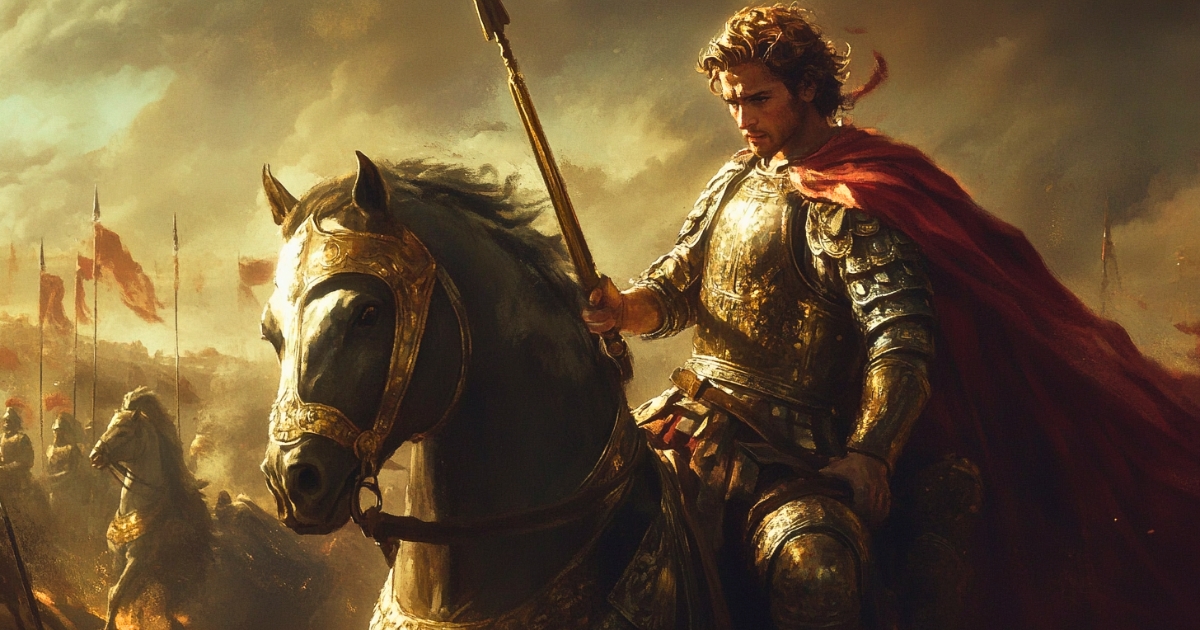Introduction
Born in 356 BC as the son of King Philip II of Macedon, Alexander inherited the throne at the age of 20 and built the largest empire in the ancient world in just 13 years. His eastern expedition is known as one of the most ambitious and successful military campaigns in history.
The Complex Motives of the Expedition
Alexander’s eastern expedition had complex motives beyond mere territorial expansion:
- Father’s Will and Revenge: Continuing Philip II’s plan to invade Persia and avenging past Persian invasions of Greece.
- Unification of the Greek World: Uniting Greek city-states through a war against a common enemy.
- Personal Ambition: A strong desire to become a hero remembered in history.
- Cultural Curiosity: Genuine interest in the unknown world of the East.
Departure from Macedonia
Succession and Early Conquests
In 336 BC, after his father’s assassination, Alexander succeeded to the throne. He suppressed rebellions in Greek city-states and subdued tribes in the northern Balkans.
Preparation for the Persian Expedition
In 334 BC, he led an army of about 50,000 across the Hellespont Strait, beginning his march into Asia. His goal was to conquer the superpower of the time, the Persian Empire.
Battles with the Persian Empire
Battle of Granicus
At the Granicus River in Asia Minor, Alexander overcame the Persians’ numerical superiority with tactical brilliance, achieving a decisive victory.
Battle of Issus and Siege of Tyre
In 333 BC, he defeated Persian King Darius III in northern Syria at Issus, then captured the Phoenician city of Tyre after a seven-month siege, establishing control over the eastern Mediterranean coast.
Battle of Gaugamela
In 331 BC, at Gaugamela in what is now northern Iraq, Alexander defeated the Persian army despite being outnumbered, effectively completing the conquest of the Persian Empire.
Expansion of the Empire Eastward
After occupying Babylon, Susa, and Persepolis, Alexander crossed Central Asia and invaded India in 327 BC. He fought fierce battles with King Porus in the Punjab region but abandoned further eastern advancement due to his army’s fatigue and desire to return home.
The Legacy of Alexander’s Empire
Spread of Hellenistic Culture
Greek-style cities were built in conquered territories, Greek became the common language, and a cultural fusion called “Hellenism” emerged.
Political Integration and Trade Development
While respecting local customs, Alexander introduced Greco-Macedonian administrative systems. He promoted trade within the empire, bringing economic prosperity.
Advancements in Science and Technology
New knowledge gained from the expedition led to significant progress, especially in geography, botany, and zoology.
Alexander’s Death and the Division of the Empire
Alexander died suddenly at the age of 32 in Babylon in 323 BC. Factors contributing to the empire’s division included:
- Succession Problem: Lack of a clear successor triggered the division.
- Difficulty of Governance: Centralized control of vast territories was challenging with the technology of the time.
- Cultural Diversity: Difficulty in uniformly managing diverse cultures and ethnicities.
- Ambitions of Generals: Power struggles among influential generals.
- Local Independence Movements: Conquered regions’ moves towards independence.
Negative Aspects of the Conquest
Alexander’s conquests also had negative aspects:
- Destruction of Cities: Thorough destruction of resistant cities and civilian casualties.
- Forced Cultural Change: Introduction of Greek culture suppressing local traditions.
- Human Losses: Loss of young generations in Macedonia and conquered territories due to long expeditions.
- Economic Exploitation: Burden on local economies due to the extraction of resources and wealth from conquered territories.
- Political Instability: Political turmoil in many regions caused by rapid imperial expansion.
Conclusion
Alexander the Great’s eastern expedition reshaped the map of the ancient world and had significant cultural and economic impacts. His military talent and political acumen continue to influence later leaders. At the same time, his short life and the rapid collapse of his empire illustrate the transience of power and the difficulty of maintaining an empire.
Alexander’s legacy has both positive and negative aspects and continues to influence cultures in the Middle East and Asia today. His eastern expedition is remembered as one of the most important and controversial events in history due to its complexity and multifaceted nature. By understanding this expedition from multiple angles, we can gain deeper insights into the transformation of the ancient world and the light and shadow brought by empire-building.


